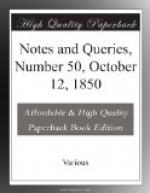S.W. SINGER.
Mickleham, Sept. 30. 1850.
Eisell (Vol. ii., p. 242.).—The attempt of your very learned correspondent, MR. SINGER, to show that “eisell” was wormwood, is, I fear, more ingenious than satisfactory. It is quite true that wormwood wine and beer were ordinary beverages, as wormwood bitters are now; but Hamlet would have done little in challenging Laertes to a draught of wormwood. As to “eisell,” we have the following account of it in the “Via Recta ad Vitam longam, or a Plaine Philosophical Discourse of the Nature, Faculties, and Effects of all such Things as by way of Nourishments, and Dieteticale Observations make for the Preservation of Health, &c. &c. By Jo. Venner, Doctor of Physicke at Bathe in the Spring and Fall, and at other Times in the Burrough of North-Petherton, neere to the Ancient Haven Towne of Bridgewater in Somersetshire. London, 1620.”
“Eisell, or the vinegar which is made of cyder, is also a good sauce, it is of a very penetrating nature and is like to verjuice in operation, but it is not so astringent, nor altogether so cold,” p. 97.
J.R.N.
* * * * *
REPLIES TO MINOR QUERIES.
Feltham’s Works (Vol. ii., p. 133.).—In addition to the works enumerated by E.N.W., Feltham wrote A Discourse upon Ecclesiastes ii. 11.; A Discourse upon St. Luke xiv. 20.; and A Form of Prayer composed for the Family of the Right Honourable the Countess of Thomond. These two lists, I believe, comprise the whole of his writings. The meaning of the passage in his Remarks on the Low Countries, appears to be this, that a person “courtly or gentle” would receive as little kindness from the inhabitants, and show as great a contrast to their boorishness, as the handsome and docile merlin (which is the smallest of the falcon tribe, anciently denominated “noble"), among a crowd of noisy, cunning, thievish crows; neither remarkable for their beauty nor their politeness. The words “after Michaelmas” are used because “the merlin does not breed here, but visits us in October.” Bewick’s British Birds, vol. i. p. 43.
T.H. KERSLEY.
King William’s College, Isle of Man.
Harefinder (Vol. ii., p. 216.).—The following lines from Drayton’s Polyolbion, Song 23., sufficiently illustrates this term:—
“The man whose vacant mind prepares him to the sport The Finder sendeth out, to seeke out nimble Wat,— Which crosseth in the field, each furlong every flat, Till he this pretty beast upon the form hath found: Then viewing for the course which is the fairest ground, The greyhounds forth are brought, for coursing then in case, And, choycely in the slip, one leading forth a brace; The Finder puts her up, and gives her coursers’ law,” &c.
In the margin, at the second line, are the words, The Harefinder. What other instances are there of Wat, as a name of the hare? It does not occur in the very curious list in the Reliquiae Antiquae, i. 133.




